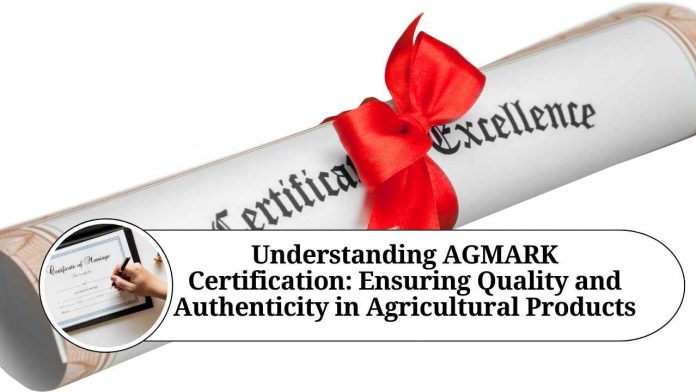Introduction
In today’s fast-paced and highly competitive world, consumers are becoming increasingly conscious about the quality and authenticity of the products they purchase. This holds true not only for industrial goods but also for agricultural products. To address this concern, various certification systems have been put in place worldwide to guarantee the quality and safety of agricultural produce. In India, one such certification is AGMARK. In this blog, we will delve into the details of AGMARK certification, its significance, and how it benefits both producers and consumers.
What is AGMARK Certification?
AGMARK, an acronym for Agricultural Marketing, is a certification mark employed on agricultural products in India. It was introduced by the Government of India in 1937 under the Agricultural Produce (Grading and Marking) Act. AGMARK certification ensures that the agricultural products marked with the AGMARK seal meet certain quality standards and conform to the specific regulations set by the Agricultural Produce Grading and Marking Act.
Importance of AGMARK Certification
- Quality Assurance: AGMARK certification provides a reliable assurance of quality to consumers. It signifies that the agricultural product has undergone rigorous testing and meets the defined quality standards. This helps build trust between consumers and producers, encouraging repeat purchases and enhancing market demand.
- Standardization: AGMARK sets the standard specifications for various agricultural products, including grains, spices, edible oils, fruits, vegetables, and more. These specifications encompass parameters such as purity, moisture content, size, color, and maturity, ensuring uniformity and consistency in the market. Standardization facilitates fair trade practices and prevents the sale of substandard or adulterated products.
- Consumer Protection: AGMARK certification aims to protect consumer interests by preventing the sale of low-quality or counterfeit agricultural products. The certification mark allows consumers to make informed choices and purchase products that meet their quality expectations. It acts as a safeguard against fraud, misrepresentation, and adulteration in the market.
- Market Access: AGMARK certification opens up new avenues for producers by enhancing market access. Many government institutions, public sector undertakings, and bulk purchasers require AGMARK certified products, making it mandatory for suppliers to adhere to the certification process. This creates opportunities for farmers, processors, and traders to expand their business and enter new markets.
- Export Competitiveness: In the international trade scenario, AGMARK certification plays a crucial role in boosting the competitiveness of Indian agricultural products. It assures foreign buyers that the products meet specific quality standards, giving them confidence in the reliability and safety of the goods. AGMARK certification acts as a valuable tool in penetrating global markets and increasing exports.
AGMARK Certification Process
The process of obtaining AGMARK certification involves the following steps:
- Application: The producer or processor interested in obtaining AGMARK certification needs to submit an application form to the relevant authority. The application should include details about the product, its quality parameters, and other relevant information.
- Inspection and Sampling: After the application is received, an authorized inspector visits the premises to inspect the product, verify its compliance with quality standards, and collect samples for testing.
- Laboratory Testing: The collected samples are tested in government-approved laboratories to assess various parameters such as purity, moisture content, chemical composition, and physical attributes. The test results are then evaluated against the predefined quality standards.
- Certification and Marking: If the product meets the quality requirements, AGMARK certification is granted. The certified product can then be marked with the AGMARK seal, indicating its authenticity and quality.
Conclusion
AGMARK certification is a vital quality assurance mark that ensures the authenticity, safety, and standardization of agricultural products in India. It provides consumers with the confidence and trust they need when purchasing agricultural goods, safeguarding their interests and protecting them from substandard or adulterated products. AGMARK certification also offers numerous benefits to producers by enhancing market demand, expanding market access, and increasing export competitiveness.
Other Related Blogs: Section 144B Income Tax Act
Frequently Asked Questions (FAQs)
Q1: What is AGMARK certification?
A1: AGMARK certification is a quality assurance mark employed on agricultural products in India. It guarantees that the products marked with the AGMARK seal meet specific quality standards and conform to the regulations set by the Agricultural Produce Grading and Marking Act.
Q2: What agricultural products can obtain AGMARK certification?
A2: AGMARK certification is available for various agricultural products including grains, spices, edible oils, fruits, vegetables, honey, pulses, and more. The certification covers a wide range of products to ensure quality and standardization across the agricultural sector.
Q3: Who can apply for AGMARK certification?
A3: Producers, processors, traders, and exporters involved in the production and marketing of agricultural products in India can apply for AGMARK certification. Both individuals and organizations can seek certification for their products.
Q4: How does AGMARK certification benefit consumers?
A4: AGMARK certification benefits consumers by assuring them of the quality and authenticity of the agricultural products they purchase. The certification mark helps consumers make informed choices, protects them from substandard or adulterated products, and ensures their safety and satisfaction.
Q5: How does AGMARK certification benefit producers?
A5: AGMARK certification provides numerous benefits to producers. It helps build trust with consumers, enhances market demand for their products, and opens up opportunities for market expansion. AGMARK certification also allows producers to comply with the requirements of government institutions and bulk purchasers.
Q6: How does AGMARK certification ensure quality and standardization?
A6: AGMARK certification ensures quality and standardization by setting specific standards and specifications for agricultural products. These standards cover parameters such as purity, moisture content, size, color, maturity, and more. The certification process involves inspection, sampling, and laboratory testing to ensure compliance with these standards.
Q7: Can AGMARK certified products be exported?
A7: Yes, AGMARK certification plays a crucial role in boosting the export competitiveness of Indian agricultural products. The certification assures foreign buyers that the products meet specific quality standards, giving them confidence in the reliability and safety of the goods.
Q8: How can one apply for AGMARK certification?
A8: To apply for AGMARK certification, interested individuals or organizations need to submit an application form to the relevant authority. The application should include details about the product, its quality parameters, and other necessary information. The certification process involves inspection, sampling, laboratory testing, and evaluation.
Q9: Is AGMARK certification mandatory for all agricultural products in India?
A9: AGMARK certification is not mandatory for all agricultural products. However, certain government institutions, public sector undertakings, and bulk purchasers require AGMARK certified products. Therefore, obtaining AGMARK certification can be advantageous for market access and business opportunities.
Q10: How long is AGMARK certification valid?
A10: AGMARK certification is generally valid for a specific period, which may vary depending on the product and certification authority. It is important to renew the certification within the designated timeframe to continue using the AGMARK seal on the product.




















